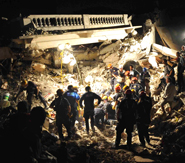Venezuelan President Hugo Chávez marked the eleventh anniversary of his first electoral victory by announcing the resignation of a close advisor in connection with a corruption scandal. The Venezuelan government took over seven small private banks in recent weeks, setting off financial jitters as observers wondered whether Caracas would nationalize the country’s banking sector. The banks mismanaged public funds, says the government, which issued dozens of warrants for and arrested eight bankers linked to the scandal. Arné Chacón—brother of science and technology minister, Jesse Chacón—was among those arrested, prompting the minister’s resignation.
Chávez revealed the news in episode 345 of his weekly address Alo Presidente. The leader also announced the takeover and reopening of several of the banks through a new state entity called Banco Bicentario. Despite the seizure of multiple institutions, the seven private banks accounted for as little as 8 percent of total deposits in Venezuela. Still, the institutions appear to have had close ties to the Chávez government. The four banks (Banco Provivienda, Banco Canarias, Banco Confederado, and Bolivar Banco) initially seized in November represented a quarter of the government’s funds in the banking system. Ricardo Fernández Barrueco, among the banks’ directors and those arrested, allegedly made his wealth through projects that supplied food to the government’s subsidized supermarkets.
Last week, Chávez said he had “no problem” nationalizing banks that misappropriated state funds and failed to extend credit to the poor. Days later, the government seized three more banks—Baninvest, Banco Real, and Central Banco. The Venezuelan bolivar, which skidded in the wake of the interventions, recovered Monday as worries eased about short-term nationalization of the banking sector. But The Wall Street Journal reports that Chávez’s anti-corruption drive may win points with the Venezuelan public and distract from woes that range from power outages to a recession. On top of that, a group of Venezuelan college students held a 17-day hunger strike that ended December 8. The protesters sought OAS attention for their complaints of government abuses, including arrests of opposition leaders.
Former Central Bank Governor Domingo Felipe Maza Zavala said in an interview over the weekend that the current banking crisis may not run as deep as did the country’s 1994 economic crisis. Still, he said the takeovers could spell rising inflation, supply shortages, and additional rationing of electricity and water services in the coming year.




